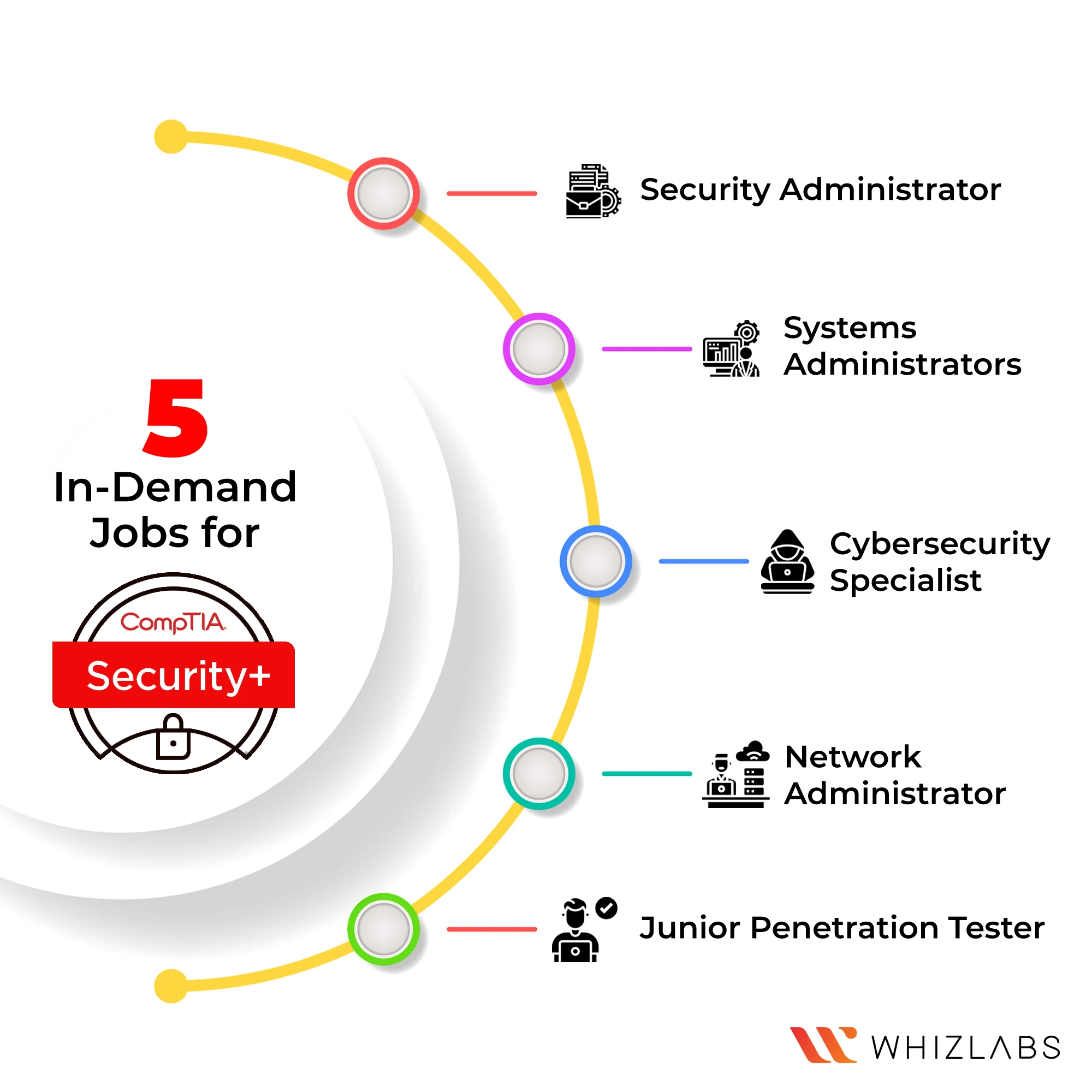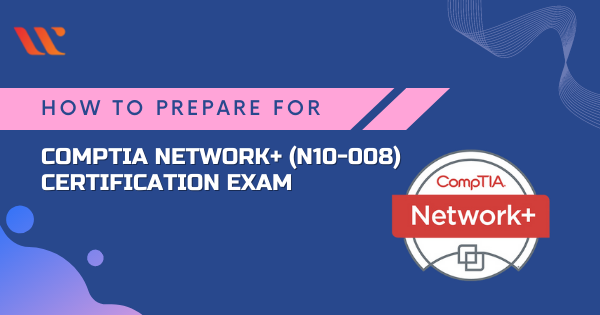Data-driven decisions are everything for organizations today if they want to stay relevant in the ever-evolving tech space. However, more data in your network also means increased threats, thefts, breaches, leaks, and whatnot. This means these companies desperately need highly proficient cybersecurity personnel who can keep their forts secure and free of unauthorized access and attacks.
Speaking of wider horizons in the cybersecurity domain, if you wish to leverage the scope, then certifications are the best way to upskill and validate yourself in the market. And CompTIA Security+ certification is one of the industry-preferred courses that have the potential to open doors to numerous dynamic job roles and opportunities.
This blog will walk you through 5 such in-demand jobs for CompTIA Security plus certified professionals. But before diving into that, let’s have a quick look at the cert overview, the outlook for 2024, and what this cert means for your career. Time to dig in.
Overview of CompTIA Security Plus Certification
The CompTIA Security+ certification is a vendor-neutral program designed to equip you with the necessary skills to effectively handle vital cybersecurity responsibilities and build an efficient IT career at scale. It is the foundational security certification mandatory for every aspiring IT professional wishing to expand their career path.
This certification helps you validate your efficiency in handling cybersecurity functions required for intermediate-level job roles in the cybersecurity domain. Besides, this cert acts as a stepping stone for career advancement, enabling you to seize relevant opportunities.
By deploying best practices and hands-on troubleshooting techniques, the CompTIA Security+ certification equips you with crucial abilities like:
- Evaluate an organization’s security posture and propose and implement suitable solutions.
- Monitor and secure hybrid environments encompassing cloud, mobile, and IoT devices.
- Operate in compliance with relevant laws and policies, including governance, risk, and compliance principles.
- Identify, analyze, and respond effectively to security events and incidents.
Significance of CompTIA Security+ Certification in 2024
In an ever-evolving landscape of technology and increasingly sophisticated cyber threats, the demand for skilled cybersecurity experts is soaring to new heights. It’s like a race against time, where this certification becomes your ticket to a promising future. There’s a huge gap in cybersecurity skills in the IT industry, creating a golden opportunity for those who possess the coveted CompTIA Security Plus certification.
Moreover, the Bureau of Labor Statistics (BLS) predicts a notable 3% growth in employment opportunities within this sector by the year 2031. This projection highlights the positive outlook for individuals with Security+ certification, indicating a promising and expanding job market in the coming years.
While the projected annual job growth of 3% in network and computer systems administration may be slightly lower than the overall average across occupations, it still translates to an average of 23,900 new positions opening up over the next decade.
These opportunities will arise due to various factors, including retirements and experienced professionals transitioning into more specialized career paths after gaining valuable experience.
So, even though the growth rate may not be the highest, there will still be a significant number of vacancies to be filled, creating ample prospects for individuals entering or progressing in the field. And with organizations desperately seeking talented individuals like you to fortify their defenses, you can expect competitive salaries and a world of exciting possibilities.
It’s a good time to dive into the world of cybersecurity, where your skills will be in high demand and your expertise valued like never before.
What does CompTIA Security Plus certification mean for your career?
Getting through the Security+ exam is no easy task. That’s why earning the Security+ certification boosts your value to employers now and in the future. You can:
- Explain the security functions of common network devices and technologies in any type of network setup, making you an asset to virtually any employer.
- Apply secure network administration principles and procedures in almost any environment you come across, ensuring the safety of networks and systems.
- Set up and securely configure wireless networks, including Internet-of-Things devices and networks. This makes you crucial as the use of devices continues to expand.
- Possess the skills to identify security threats and quickly mitigate them, minimizing potential damages to organizations.
- Understand the policies, laws, and regulations related to IT security, whether they are local or global. This helps organizations avoid potential fines from compliance authorities.
- Explain the impact of environmental controls and utilize them appropriately to enhance security measures.
- Apply cryptography and Public Key Infrastructure for secure encryption methods.
- Educate others on user authentication, authorization, and access control, emphasizing the importance of security among colleagues and making security everyone’s responsibility.
- Understand the significance of data confidentiality, integrity, and availability, ensuring the protection and reliability of critical information.
- Identify and analyze common attacks, such as social engineering, malware, and application and wireless attacks, enhancing your ability to safeguard systems and networks proactively.
Also know : How to prepare for the CompTIA Security+ SY0-601 Certification Exam?
5 In-Demand Jobs for CompTIA Security+ Certified Professionals
If you have a CompTIA Security+ certification, you might want to explore one of these high-demand cybersecurity jobs.
Security Administrator
Security administrators are crucial for keeping data safe and ensuring secure computer systems. They must create secure systems, update rules, and protect against possible threats. They pay close attention to cybersecurity to ensure the company is prepared and protected from any bad security situations.
A security administrator holds various responsibilities, including:
- Integrating security requirements into systems to ensure robust protection.
- Installing firewalls or other security tools to fortify the organization’s defenses.
- Implementing security plans tailored to meet the specific needs of the organization.
- Conducting regular scans and performing security audits to identify vulnerabilities.
- Monitoring network traffic closely and promptly responding to any unusual or suspicious activities.
As a security administrator, you should think about things like conducting site surveys, using Wi-Fi analyzers, and deciding where to place wireless access points (WAPs). To do these tasks well, security administrators must know how to set up the right security protocols to keep network designs safe. The U.S. Bureau of Labor Statistics says security administrators can earn up to $83,510 annually.
Systems Administrators
If managing and taking care of computer systems and software applications and finding ways to make them more secure excites you, a systems administrator role can be the perfect career milestone for you. In this job, you will be responsible for maintaining and improving the information systems infrastructure and the software used by the organization. According to CyberSeek, professionals specializing in incident response as system administrators have the potential to earn an average yearly salary of $85,000.
A system admin handles various tasks related to computer networks, wireless technologies, and enterprise applications. Some of these tasks include:
- Finding and fixing problems with computer systems
- Installing or updating the software that runs the computer
- Setting up and making sure the computer is running at its best
- Deploying new servers, whether they are a combination of on-site and cloud-based
Junior Penetration Tester
If you enjoy being on the legal side of hacking and finding vulnerabilities in computer networks, then a junior penetration tester job might be a great fit for you. As a junior pen tester, you will use your cybersecurity skills to simulate hackers’ actions and help identify network weaknesses.
A penetration tester is someone who checks for weak points in an organization’s physical controls and computer systems. They do this by:
- Using the right tools to test for weaknesses.
- Trying out social engineering tests and reviewing physical security when needed.
- Staying updated on the latest methods and techniques used in testing and hacking.
- Gathering data and following a testing process.
- Finding, evaluating, and managing vulnerabilities.
CompTIA Security Plus certification validates your skills to understand the basics of penetration testing and red team skills. Your certification shows that you have the knowledge required for this kind of work. According to CyberSeek, an experienced penetration tester earns an average annual salary of $104,000. Not only that, but this position is also in high demand. The U.S. Bureau of Labor Statistics predicts a 31% growth in information security employment by 2029, which is significantly faster than the average for all occupations.
Also Read : CompTIA Security+ Interview Question and Answers (SY0-601)
Cybersecurity Specialist
Cybersecurity specialists need to focus on keeping an organization’s information systems safe from breaches. They analyze risks and come up with strategies to prevent cyber attacks. Like other jobs mentioned, cybersecurity specialists monitor, detect, analyze, and respond to security incidents to protect against cyber threats. It’s crucial for a company to have a secure and functioning network, so the skills of cybersecurity specialists are in high demand and essential for the smooth operation of businesses.
A cybersecurity specialist has several daily tasks, such as:
- Keeping an eye out for any strange or suspicious activity that could be a cyberattack or threat.
- Putting security measures in place to protect against vulnerabilities.
- Creating firewalls to secure the network.
- Giving authorized users the right permissions and privileges.
- Recommending security measures to improve protection.
- Assessing and creating strategies to ensure the organization is resilient against cyber threats.
Some cybersecurity specialists help cybersecurity architects by working on research and development for security projects. They might also write procedures for different services. These wide-ranging skills put cybersecurity specialists in high demand.
According to CyberSeek, cybersecurity specialists who perform scans to detect outside intrusions or attacks can earn an average yearly salary of $89,000.
Network Administrator
Network administrators have a role similar to systems administrators as they manage the everyday operations of an organization’s networks. Their responsibilities encompass various tasks, including the planning, installation, and support of the organization’s information systems, such as intranets, local area networks (LANs), or wide area networks (WANs).
Network administrators have important responsibilities, including:
- Keeping the network secure from potential threats.
- Analyzing and improving the performance of the network.
- Making necessary upgrades and repairs to ensure the network functions properly.
- Managing user accounts and assigning appropriate security permissions.
By earning the CompTIA Security+ certification, you gain the skills to think and act like a network administrator and demonstrate to employers that you can effectively maintain and update the organization’s network.
Network administrators’ pay and job prospects are similar to those of systems administrators. According to the U.S. Bureau of Labor Statistics, network administrators have a median annual salary of $83,510.
Some other job roles for CompTIA Security+ are in demand
If you’re thinking about a career in cybersecurity, it’s a good idea to consider these high-demand roles:
- Security Analyst
- Security Engineer or Architect
- Security/IT Director or Manager
- CISO/CSO
- Forensics Investigator
- Auditor
- Systems Engineer or Integrator
To excel in these positions, you should have a proven track record in the following areas:
- Handling and responding to security incidents
- Auditing and ensuring compliance
- Skills in firewall, intrusion detection, and intrusion prevention systems
- Detecting and responding to intrusions
- Analyzing and using intelligence for cybersecurity purposes
- Managing security information and event management (SIEM) systems
- Managing access and identity for users
- Developing secure applications
- Implementing advanced measures to prevent malware
- Understanding cloud computing and virtualization.
Also Read : 25 Free Questions on CompTIA Security+ (SY0-601) Certification Exam
Conclusion
This blog has helped you dive deeper into the CompTIA Security+ certification outlook in 2024, how it can help elevate your career, and the top 5 in-demand jobs for CompTIA Security+ certified professionals. Cracking a good-salary job, however, is a secondary step. The primary aim is always to score well in certification. For which you would need updated and authentic resources and study materials.
Whizlabs offers study materials that industry experts carefully select. These materials include a variety of practice tests and more than 26 video lectures, all designed to help you explore different domains and develop a thorough understanding of cybersecurity.
Wish to learn more about CompTIA Security Plus certification? Or, what other CompTIA certifications are relevant to your profile? Reach out to our consultants today.
- Study Guide DP-600 : Implementing Analytics Solutions Using Microsoft Fabric Certification Exam - June 14, 2024
- Top 15 Azure Data Factory Interview Questions & Answers - June 5, 2024
- Top Data Science Interview Questions and Answers (2024) - May 30, 2024
- What is a Kubernetes Cluster? - May 22, 2024
- What are the Roles and Responsibilities of an AWS Sysops Administrator? - March 28, 2024
- How to Create Azure Network Security Groups? - March 15, 2024
- What is the difference between Cloud Dataproc and Cloud Dataflow? - March 13, 2024
- What are the benefits of having an AWS SysOps Administrator certification? - March 1, 2024




